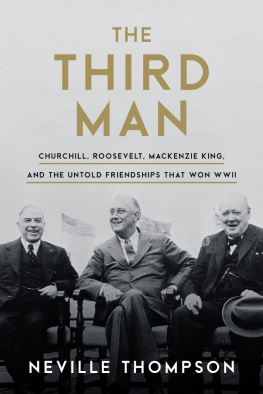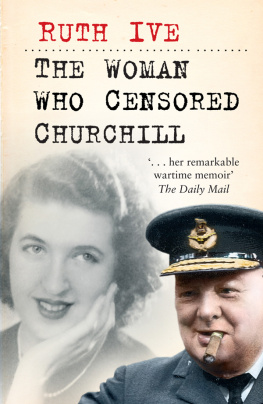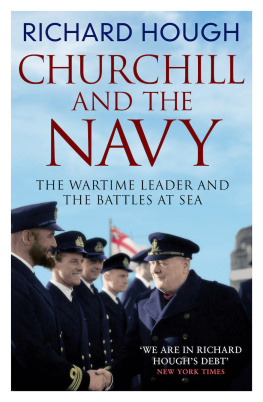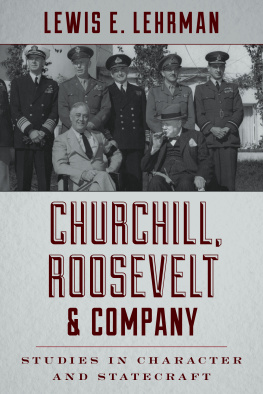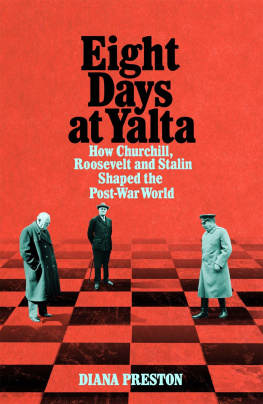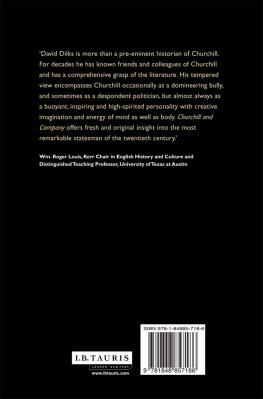ROOSEVELT
AND
CHURCHILL
Men of Secrets
David Stafford
First published by Little, Brown and Company in 1999
Copyright David Stafford 1999
This edition published in 2021 by Lume Books
30 Great Guildford Street,
Borough, SE1 0HS
The right of David Stafford to be identified as the author of this work has been asserted by them in accordance with the Copyright, Design and Patents Act, 1988.
All rights reserved. No part of this publication may be reproduced, stored in a retrieval system, or transmitted in photocopying, recording or otherwise, without the prior permission of the copyright owner.
To my transatlantic family and friends
Table of Contents
A uthors N ote
I write this during the week that the United States Navy launched its latest and most advanced guided-missile destroyer, in Bath, Maine, naming it the USS Winston S. Churchill the first time that any American ship has been named after a British figure since the war of independence over two hundred years ago. The symbolism of the ceremony, attended by a crowd of several thousand, was enriched by the fact that the vessel was personally launched by Churchills last surviving child, Lady Soames. President Bill Clinton, announcing the decision to the British Parliament in 1995, said the choice to name it after Britains Second World War leader was so that it could ride the seas as a reminder for the coming century of an indomitable man who shaped our age, who stood always for freedom.
The tenacity of what the British like to call the special relationship would have been inconceivable without the personal bond forged between Franklin D. Roosevelt and Winston Churchill during the Second World War. This has been glorified, exaggerated, mocked, derided, criticised and lamented and not necessarily in that order on both sides of the Atlantic over the last fifty years. Yet it endures, as the Maine ceremony so vividly demonstrates, and will surely survive well into the new millennium.
In thinking about and writing this book I have benefited greatly over many years from the work of numerous others. In particular, I would like to mention the following friends, colleagues and others who have all helped in different ways and at different times: Paul Addison, Director of the Centre for Second World War Studies at the University of Edinburgh; Richard Aldrich; Antony Beevor; Gil Bennett, Chief Historian of the Foreign and Commonwealth Office; Mariana Berry; Laurence Blairon, Information Officer at the International Court of Justice, The Hague; Piers Brendon, Keeper of the Churchill Archive at Churchill College, Cambridge, as well as Allen Kucia, Caroline Lye and Allen Packwood; Harry Bridgman; Ronald M. Bulatoff and Carol Leadenham of the Hoover Institution at Stanford, California; Paul Cardin; Richard Clogg; Lawrence Collins; Jeremy Crang; Ralph Erskine; Michael Foot; Sir Alexander Glen; Rhodri Jeffreys-Jones; Peter Jones, Director of the Institute for Advanced Studies in the Humanities at the University of Edinburgh, who has most generously provided me with suitable accommodation and writing facilities, and whose staff, Anthea Taylor and Charis Stewart, have been indispensable; Warren Kimball; Paul Lashmar; William Leary; Andrew Lownie; James Muller; Verne Newton, Director of the Franklin D. Roosevelt Library at Hyde Park, New York, as well as Raymond Teichman, Robert Parks and other members of his staff; Hayden Peake; Mary June Pettyfer; Ken Robertson; Norman Rose; Alan Samson and Andrew Gordon at Little, Brown; Mark Seaman of the Imperial War Museum; Bradley F. Smith; Sir Peter Smithers; Robert D. Storch; Duncan Stuart, CMG, the SOE Adviser at the Foreign and Commonwealth Office; staff at the National Library of Scotland; Wesley Wark; and Rupert Wilkinson.
Friends and family contacts across the Atlantic have also nurtured the project. I have experienced the rich rewards of Anglo-American relations through my wife Jeanne, an American by birth, and in the United States have frequently enjoyed the generous hospitality of her parents, Bettye and Walt Cannizzo, who lived through the Second World War and retain vivid memories of the Roosevelt and wartime years. To them, to other members of my wifes American family, and to many American friends, I dedicate this book.
D avid S tafford
Edinburgh, 20 April 1999
If anything happened to that man I couldnt stand it. He is the truest friend; he has the furthest vision; he is the greatest man I have ever known.
churchill on roosevelt , 1943
One of the greatest sources of danger to us in this war is the temptation to regard as our first enemy the partner that must work with us in defeating the real enemy.
general dwight d. eisenhower , 1943
There are no friendly secret services; only the secret services of friendly powers.
time-honoured adage
P rologue
Franklin Delano Roosevelt and Winston Spencer Churchill sit chatting together on a bench. The American President stretches his arm along its back towards the British Prime Minister, a cigarette in its holder poised delicately between his fingers. Their body language is relaxed. Churchill, wearing a bow tie, is gripping the inevitable cigar. It seems they have just shared a joke, for each is smiling broadly at the other, like friends caught in an intimate moment by the camera.
Yet this is not some Cartier-Bresson photograph, but a bronze sculpture, and the two men, as its title reminds us, are political allies. Unveiled in 1995 in Londons New Bond Street to commemorate the fiftieth anniversary of VE day, it stands a stones throw from such icons of blue-chip taste as Aspreys, Tiffany & Co. and Cartier and only a hundred yards or so from Browns Hotel, where Roosevelt spent part of his honeymoon before the First World War. So popular and celebrated has Lawrence Holofceners sculpture become that it now forms part of the knowledge, the arcane grasp of Londons streetscape the capitals taxi-drivers need to acquire for their licence. Tourists perching on the bench to have their picture taken have rubbed Roosevelts knee shiny with their hands.
Its a remarkable tribute to the enduring relationship between the United States and Britain forged in that last good war half a century ago. Much heart-warming myth has since encrusted around this alliance. The greatest myth-maker was Churchill himself, who in his post-war history of the Second World War airbrushed Anglo-American relations of their blemishes and presented Roosevelt as an almost bosom buddy. Yet in reality Roosevelt never even visited London during the war. The city immortalised for Americans during Hitlers bombing blitz by the famous wartime photograph of St Pauls Cathedral, its dome dramatically etched against a vivid background of flames and smoke, and by the gravelly-voiced reports of Edward R. Murrow over the CBS radio network, was a stranger to the wartime journeys of the President of the United States. This was deliberate. Despite numerous appeals from Churchill, Roosevelt adamantly refused to visit him. His stand had nothing to do with the dangers of journeying to the war-ravaged capital, or the Presidents increasingly fragile health, factors that did not prevent him from travelling to such far-flung places as Gambia, French Morocco, Egypt, Malta and Iran not to mention the gruelling trip to Yalta in the Soviet Crimea just weeks before his death.
London was out, Roosevelt told Churchill in December 1942, for political reasons. He did not elaborate, because there was no need. For London was not just the British capital, it was also the heart of an Empire whose territorial possessions straddled the globe, and Roosevelts long-standing anti-colonialist views were well known to Churchill. Only weeks before, in an Open Letter to the People of England, Life magazine had spelled out what was also a widespread sentiment among ordinary Americans when it declared that they were not fighting to hold the British Empire together. By visiting London, Roosevelt would have been condemned for placing himself in Churchills imperial pocket. And for all the criticisms since levelled against Roosevelt that he failed to anticipate Pearl Harbor, that he secretly manipulated events to drag his country into the war, that he navely delivered Eastern Europe into Soviet hands at Yalta, that he refused to bomb Auschwitz and rescue the Jews its noteworthy that no one has seriously accused him of selling out to Churchill, the bulldog embodiment of the British Empire.


